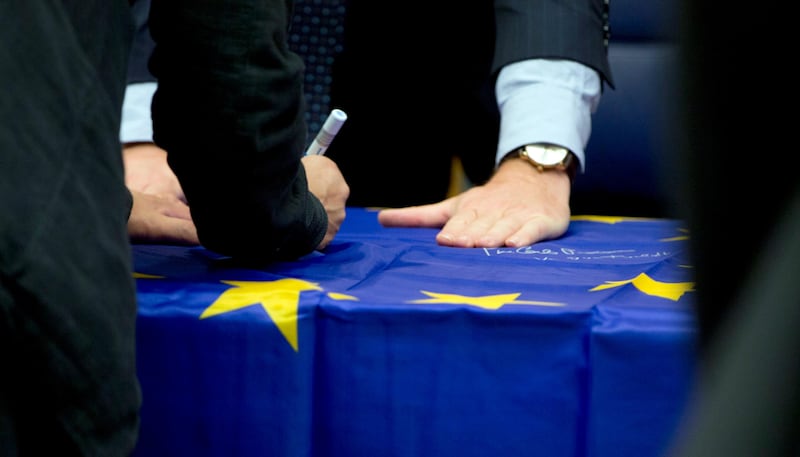Companies in the euro zone are hiring at the fastest pace in over a decade, according to a closely-watched survey of business activity published Tuesday.
The purchasing managers' index, a gauge of activity in the services and manufacturing sectors by IHS Markit, edged down to 55.9 points in October from 56.7 in September. The index is on a 100-point scale, with anything above 50 indicating growth.
Although the index's overall figure edged down, the relatively high level suggests the 19-country euro-zone economy continued its strong period of expansion this year.
Firms reported a rise in orders, leading to the need to hire more staff. The rate of job creation was the highest in over a decade.
Manufacturing in particular is enjoying a boom, thanks in part to a decline in the value of the euro earlier this year. Jobs growth in the sector was the highest since the survey began in June 1997.
France and Germany stood out as top performers in the bloc, with smaller economies growing at a slightly slower but still robust pace.
"The euro-zone economy has had a good year so far, and the initial signs are that this has continued at the start of the final quarter of 2017," said Andrew Harker, an associate director at IHS Markit.
Today's report came as the French finance minister Bruno Le Maire announced that big French companies will be forced to pay an "exceptional contribution" to make up for a dividend tax cancelled by French and EU courts.
Although the French president Emmanuel Macron's government is cutting corporate tax, it has little choice but to find an additional levy to make up for an up to €10 billion (Dh43.19bn) revenue shortfall, and penalties left by the cancelled tax.
_____________
Read more:
Euro's rapid appreciation another signal of Europe's recovery
Hungary may adopt euro faster than expected
Europe is back: is now the time to invest?
_____________
Mr Le Maire, a conservative who has repeatedly accused his Socialist predecessors of amateurism for creating the 3 per cent dividend tax, described it as a "state scandal".
Companies such as the insurer AXA and telecoms group Orange successfully challenged the tax in court.
"There will be an exceptional contribution," Mr Le Maire said, adding it would ideally be levied this and next year, with penalty fees piling up as cases go unresolved.
The government was considering levying the tax on firms with revenues of over €1bn and possibly increasing it for those with revenue above €5bn, Mr Le Maire added.
The exceptional tax runs against Mr Macron's pro-business reform agenda which aims to ease payroll charges and gradually cut corporate tax from 33.3 per cent to 25 per cent over five years.
However, the hole in the budget caused by the scrapped tax jeopardises Mr Macron's ambitions of bringing the public sector budget deficit in line with EU rules, allowing France to exit an excessive deficit procedure to which it is currently subject.
"If we don't show our European partners quickly how we plan to reimburse the €10bn, we won't get out of the excessive deficit procedure and we'll remain the black sheep of Europe," said Mr Le Maire.
The Socialist government of the former president Francois Hollande introduced the 3 per cent tax in 2012 on companies' dividends to encourage them to re-invest profits.
Because the tax covered dividends paid by the EU subsidiaries of French parent companies, the European Court of Justice (ECJ) struck it down in May on the grounds that ran against EU law by creating double taxation within groups.
Mr Macron's government is hoping to convince the European Commission that the case is a one-off event and that its deficit-cutting plans remain firmly on track.
Ironically, the commissioner charged with considering the issue is Pierre Moscovici, who was none other than the French finance minister in place when the tax was created.






